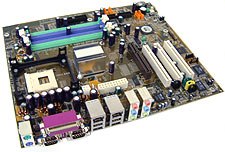 Unreal Tournament 2003 Unreal Tournament 2003 |
Source: Epic |
|
Unreal Tournament 2003 is the sequel to 1999's
multiple 'Game of the Year' award winner. It uses the very latest Unreal Engine
technology - where graphics, sound and game play are taken beyond
the bleeding edge. Unreal Tournament 2003 employs the use of Vertex as well as
Pixel Shaders and it's recommended that you use a DirectX 8 videocard to get the
most out of the game.
Again the Intel based motherboards pull out a slight lead
but it's marginal and you're definitely not going to notice the difference when
you're
gaming!
VIA's for real with their PT880
 While VIA have
been relatively absent from the Intel chipset world for quite some time, they have certainly
come back to the forefront with their guns blazing.
While VIA have
been relatively absent from the Intel chipset world for quite some time, they have certainly
come back to the forefront with their guns blazing.
Despite
being badly beaten in the AthlonXP arena (KT600... cough, cough), VIA have shown they
are able to regroup, and have since taken the Athlon64 performance crown. As drivers
mature VIA also has the potential to steal away the Pentium 4 from the
looks of what we have seen the PT880 chipset tackle.
Please remember that the PT880 chipset in the reference board
is not final silicon, and the companies engineers may very well be able to squeeze out a
bit more performance with the final revision. In any event, we can comment on
hypothetical's, so let's look at what we've actually seen.
Built from the ground up, the VIA PT880 has a strong
memory controller. Dubbed DualStream64, VIA promised better data prefetch and
improved memory branch prediction and it's safe to say that they delivered. In
terms of bandwidth (traditionally VIA's weak point) the PT880 scores just as
well as Intel's i875P in SiSoft Sandra, and just a tad lower in the
memory portion of PCMark2002.
As you
can clearly see from the benchmarks the PT880 is fast. In 2D applications the PT880
pretty much matches both Intel and SiS' offerings. In 3D apps, the chipset
is 2-3% slower than the i875P. While the reference board did have overclocking options, we
didn't get very far. I guess we'll all have to wait
for a retail board to find the answer to that question.
We were also impressed with VIA's Envy24PT audio controller; supporting 7.1 audio,
Dolby Digital EX and DTS ES puts it in good running to negate the need for
a PCI based soundcard. From our conversation with VIAs representative, retail motherboards are now available and since they're using final silicon, expect them to be yet a bit faster!
Find out about this and many other reviews by joining the Weekly PCstats.com Newsletter today!
Related
Articles
Here are a few other articles that you might enjoy
as well...
1. SiS 655FX Chipset
Reference Motherboard
